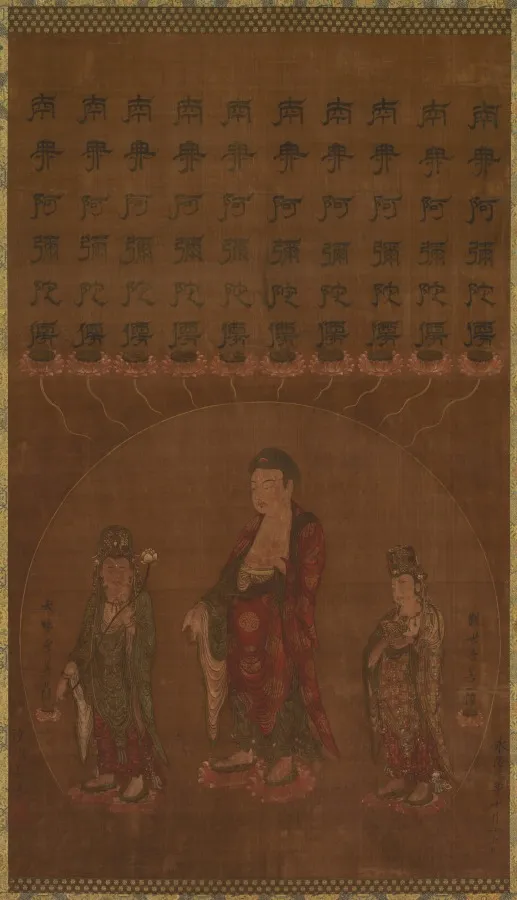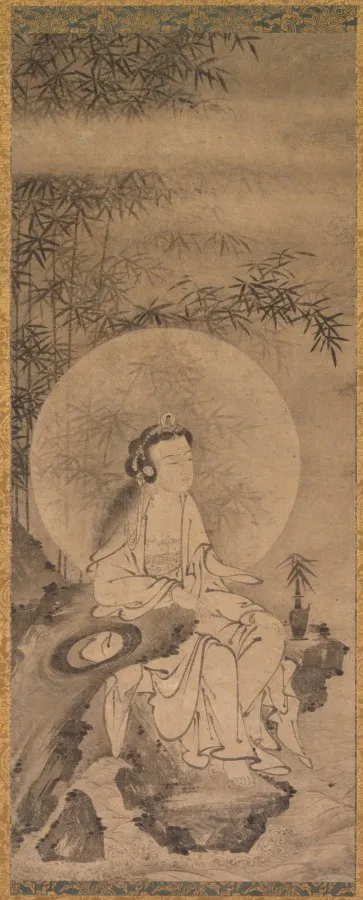An Imitation of the Eternal Forms (AiD S1E25)
Last updated: 7/17/2024 | Originally published: 6/8/2020

Buddha Amitabha with Two Attending Bodhisattvas, 1200s
Boy, what a year, huh?
What I’m Thinking About
Black lives matter.
I’ve done the bare minimum (literally, the bare minimum) that I can and put a few dollars towards a couple worthy causes; I’ll put up a list of all the ones I’ve seen recommended at the end of this section.
But before I go on, I want to point your attention to a video essay, where (white) jazz bassist Adam Neely1 talks about ”The ****ed up legacy of the arrest of Miles Davis”—I didn’t realize Miles Davis ended up in an “altercation” with a cop shortly before the release of flawless masterpiece Kind of Blue. Neely makes the point that black lives matter not just because of course lives matter intrinsically, but also specifically because black culture has made up such a huge part of American culture.
- The Bail Project; for those in the Bay Area, there’s also the Silicon Valley DSA’s bail fund, and for other’s, here’s a huge list
- National Police Accountability Project
- NYC Books Through Bars
- Paul Kafasis of One Foot Tsunami has a few recommendations
- And, of course, the Black Lives Matter Support Bundle (which has my personal favorite game of all time, The Norwood Suite) and the massive Bundle for Racial Justice and Equality (which has indie darlings like Night in the Wood and A Short Hike), both on itch.io.

Seated Guanyin, late 17th/18th century
What I’m Reading
I picked up a few more books from Bookshop, the indie-supporting Rebel Alliance to Amazon’s Empire. Of course, they do run afoul of logistics; $5 to ship three books, and they didn’t arrive for two full weeks 😔 On the other hand, at least I can be glad it’s less likely any of the people packing and shipping it contracted coronavirus? In any case, I got Plato’s Timaeus, aka “the demiurge dialogue”, as well as Apuleius’ The Golden Ass and the NASSCAL edition of the apocryphal Acts of Peter. I blew through Timaeus (and its companion Critias) this weekend, since it is rather short. It’s famous for being one of Plato’s later dialogues, where Socrates barely gets a word in edgewise, and contains his creation myth where the “demiurge” creates the world as an imitation of the eternal Forms that Plato was always going on about. Interestingly, it does have a lot of other content; it’s something of an ancient “theory of everything”, and tries to explain everything from the construction of the cosmos to how the senses work (and all in about 100 pages!). It is, of course, incorrect in almost every detail, from our modern scientific perspective. But it is surprising that it predicts some aspects of modern physics in some ways; notably, Plato’s mouthpiece Timaeus argues that the four classic elements (earth, air, water, and fire2) are actually made up of “atoms” that are actually the Platonic solids (like cubes and dodecahedrons and so on), which are themselves made up of tiny triangles, which isn’t too far off from the colorful quarks of subatomic physics, not even to mention Tegmark’s mathematical universe hypothesis. In any case, I’m not sure I can recommend reading it unless you’re very interested in the history of ideas, since it is, well, incorrect, and full of good old fashioned Ancient Values™️ (Timaeus at one point claims that immoral men are reincarnated as women 😐). But if you are going to read it, the Oxford World Classics edition did seem like a reasonable translation; maybe the dialogue is just less heady than I expected, but it’s actually kind of fun to read? It also contains the Critias, the unfinished sequel to Timaeus that’s (probably) the ultimate source for the Atlantis myth.
Scott Alexander continues his wonderful series of book reviews with coverage of Julian Jaynes’ The Origin of Consciousness in the Breakdown of the Bicameral Mind, which infamously argued that ancient Mesopotamians, Egyptians, and Greeks weren’t “conscious” and instead believed that their thoughts literally came from the gods (hence why the Homeric epics have an awful lot of the Greek pantheon messing around with people). That always struck me as a… stretch (even without having tried to read the book), but Scott Alexander has convinced me to give it another thought. He reframes it as a story not about consciousness, but theory of mind; in particular, he points out that our modern theory of mind (that we are individuals thinking thoughts, and other people are individuals thinking their own thoughts) does not seem to be innate, and it’s entirely possible that the ancients had a theory of mind that instead emphasized divine inspiration. Admittedly, even this reframing runs afoul of “okay, but what about China?” (did China invent modern theory of mind on its own?), but his review is still interesting throughout just for the concept of “theory of mind as invention”, which seems like a fruitful avenue for further thought.

Bodhisattva Guanyin of the South Sea, 1600s
What I’m Listening To
I discovered two podcasts this month.
The first is Wind of Change, in which a reporter investigates a story that the band the Scorpions’3 anthemic Wind of Change was actually ghostwritten by the CIA to encourage regime change in the Soviet Union. Now, that concept is already worth listening to; but the reporting does further explore a wide variety of other topics, like whether covert actions are compatible with democracy, why the topic is still so secret, and to what extent a musical anthem can actually exert soft power. Basically, come for the silly stories about German rockers belting out English power ballads while being watched by the KGB, stay for the deeper questions it raises (which is the point of all good nonfiction, no?).
I’m also listening through Literature and History, a history of English literature from its deepest roots, by which the podcast means ancient Mesopotamia. Basically, each episode tells the story of some classic that influenced English literature (no matter how tenuously) and then explores the social and historical context of the work. I don’t really have a lot to add; it’s just a great podcast.
What I’m Watching
Folding Ideas (one of my favorite video essayists on YouTube) has a humorous video called Cooking Food On The Internet For Fun And Profit, where he analyzes the nascent genre of “Internet cooking shows” and why they’re much more difficult to pull off than you might expect. It also mentions bannock, the Canadian version of frybread, as mentioned on “Dancing Toward Wounded Knee: The Hope and Tragedy of the Ghost Dance Religion” (linked last week).
I discovered a new video essayist, Solar Sands, this week as well. ”When Art Restoration Goes South” analyzes the infamous “Ecce Homo” repainting and argues that, ultimately, the botched refresh may have been more valuable than the original painting. ”The Secret Darker Art of Dr. Seuss” provides an overview of Dr Seuss’ semi-secret “midnight paintings”, which are (perhaps obviously) much darker and more surreal than his children’s books. I really, really love some of the works talked about, like “Cat From The Wrong Side of the Tracks”, “The Great Cat Continuum”, and “Pink-Tufted Small Beast in a Night Landscape”.
Based on a Hacker News comment (when will I learn not to browse Hacker News comments?), I decided to look up some of the Great Courses, which, despite their apparent lack of budget and potato-quality graphics, are actually rather informative. Even better, they’re all available on Kanopy, for free, for anybody with a library card! Good stuff. I’ve been watching Law School for Everyone, which is a nice overview of the American judicial process and how lawyers work.

White-Robed Guanyin, Zhang Yuehu, late 1200s
What I’m Trying
Inspired by this random blog post I found on Hacker News, I decided to take the plunge and start a Zettelkasten. As far as I can tell, it’s still basically just a personal wiki 🤔 In any case, as recommended in that blog post, I’m trying out Zettlr, which seems to finely accomplish at least the bare minimum of a.) adding notes and b.) linking them. I’ve only added a couple notes but I already like the feeling of linking them together and adding to them over time; but, let’s see if I’m still using it a month from now.
What I’m Working On
I’m proud to say I’ve continued to write 500ish words per day; I’m up to about 7000 words on Bear (which I’m still trying to think of a better name for) and added a thousand words to an older idea that never quite got finished. I’m still planning to devote some time to essays at some point—now that I’ve gotten started, I can say I highly recommend a daily writing habit.
I’ve also started kicking around ideas for a new game, probably digital, that would be something like a mix of Civilization and Dominion. Basically, you’d represent a state on a tile-based map (a la Civilization) but you would interact through the world via a deck building mechanic. I don’t have a whole lot, but in the spirit of working with the garage door up, I’ll link a doc once something non-trivial has been worked out for it.
Finally, I’m thinking of a new format for this newsletter. Like Robin Sloan and Craig Mod always say, it’s nice going into a project knowing that it will end. It’s almost the one-year anniversary of this newsletter, and I don’t think it ever quite became what I wanted it to be; it’s turned into more of a log of “here’s what I read”, which certainly has some value, but I do think it could be something… ~ more ~. I don’t know exactly what I’ll change, but keep your eyes out for Adventures in Dilettantery, season 2, coming soon to a mailbox near you 🙂

Seated Guanyin Bodhisattva, late 14th-15th century